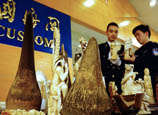
 |
| The Legend of Zhen Huan features Chen Jianbin and Sun Li playing Emperor Yong Zheng and his concubine Zhen Huan. Provided to China Daily |
A popular Chinese TV drama is seeking a US channel to air its English-language version of the show and increase its audience for the saga of love and intrigue in imperial China.
Cao Ping, producer of The Legend of Zhen Huan, says several cable channels have expressed interest.
The Legend of Zhen Huan, about the machinations of an emperor's concubines during the Qing Dynasty (1644-1911) has been a hit in China since it debuted in 2012.
In addition to the Chinese mainland, where it earned a 10 percent share of the TV-watching audience in its time slot, the show has drawn big audiences in Singapore, Malaysia and Taiwan. In one month, it racked up 2.4 billion views on various online platforms.
"We have not decided which channel will show the English version in the US, but the collaboration will not be limited to American channels. We want it to be global," Cao says.
The producer says a production company in the United States with a number of Asian-Americans on its staff will re-edit the 76 episodes into six miniseries-like installments and update the soundtrack. Additionally, some of the scenes will be reshot with the original cast members and dubbed into English, rather than use subtitles.
After its initial run, The Legend of Zhen Huan was shown on some US-based Chinese-language cable channels. One was SinoVision, which serves about 1 million Chinese-speaking viewers in New York, New Jersey, Pennsylvania and Connecticut.
"It was such a success, and it was among the highest-rated TV dramas we've imported from the Chinese mainland," says Xiang Lingling, from SinoVision's programming department.
"We got phone calls from people who missed an episode and asked for updates, and from those who requested information for costumes. We even got an American asking for subtitles."
A potential fan is Steve Garcia, a graduate student of political science whose minor is in Chinese language at California State University, Long Beach.
"I'd be thrilled to watch the TV series in America if it'll be broadcast on American channels," says Garcia, who has studied Chinese for a year and a half. "It's very difficult to watch these types of Chinese TV dramas" in the US.
"I just watched a Chinese show, Empire of Silver, through Netflix last week, and I look forward to more shows of its kind because they help me understand more about Chinese culture and language."
Amid speculation over the series' US prospects, people who follow the entertainment industry point out the difficulty of any show getting picked up for television.
Claus Mueller, a New York correspondent for FilmFestivalToday.com, says the show's success in China doesn't guarantee anything. He suggested that pay channels that cater to the Chinese-American community might be a better fit for the drama.
"Success depends in part on how it is placed. Mainstream channels or networks have become more cautious or risk-averse since their audience is shrinking each year," says Mueller, who has served as a judge for the international Emmy awards and as a curator for film festivals.
"Placement on a specialized cable channel that incorporates foreign productions and has an upscale viewership is more likely to be successful," he says.
"Here we have the Sundance Channel and the Independent Film Channel, which provide more foreign material. Other outlets are subscription networks or over-the-air stations in New York, Los Angeles and San Francisco, which are aimed at the Chinese-American audience."
















 Now you can use mobile phone to 'call' the dead
Now you can use mobile phone to 'call' the dead


![]()
